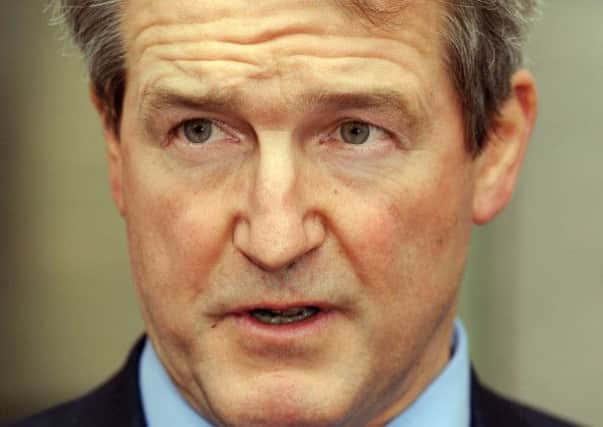We must import less food, minister tells farmers


A quarter of food eaten in the UK is imported when it could be produced here, Owen Paterson told the Oxford Farming Conference.
The Minister’s remarks are a welcome boost to the National Farmers’ Union (NFU) which is lobbying retailers, food processors, restaurants and cafes to stock more home-grown produce as part of its Back British Farming campaign.
Advertisement
Hide AdAdvertisement
Hide AdSpeaking in front of an audience of farmers at yesterday’s conference, Mr Paterson said: “As British farmers and food producers you know that we grow some of the best food in the world here – so why is 24 per cent of the food eaten in the UK imported when it could be produced here?
“We have a top-class fruit and veg sector which produces everything from green beans to strawberries, yet we imported £8bn of fruit and veg in 2012.
“We can’t grow mangoes or pineapples, but we can encourage UK consumers and food businesses to buy Scottish raspberries or Kent apples.
“This is a huge opportunity, and it’s up to all of us – farmers, food manufacturers and the Government – to take action. By buying seasonal fruit and veg we can improve the nation’s health, help the environment and boost the economy.”
Advertisement
Hide AdAdvertisement
Hide AdHe said he had asked business executive Sir Peter Bonfield to lead a governmental drive on public procurement of food.
The public sector bought £2.1bn worth of food and drink last year.
“That’s an astonishing amount of money,” Mr Paterson said.
“The public sector should be taking advantage of our top quality products, supporting our world-class farmers.”
He cited the Countess of Chester Hospital in Cheshire as being among the public institutions that are leading the way in sourcing locally produced food. The Trust buys 92 per cent of its food from the UK and has cut its meat bill by a fifth by sourcing fresh rather than frozen or poorer quality meat, Mr Paterson said.
Advertisement
Hide AdAdvertisement
Hide AdThe Yorkshire Post recently asked every local authority in the region to reveal how much of the food they source is British but most said they did not hold the data.
More than £30m was spent on food by councils in Yorkshire last year but local authorities for Wakefield, Hambleton, Harrogate, East Riding, Sheffield, Craven, Kirklees, Scarborough and Calderdale failed to provide a breakdown of how much of their food was home-grown in response to Freedom of Information requests.
But the British public has shown “phenomenal support” to the farming sector in the past 12 months, the NFU said, with producers continuing to deliver high quality produce despite unseasonable snow last April that disrupted thousands of businesses.
Hayley Campbell-Gibbons, the organisation’s chief horticulture adviser, said: “We can only commend the Secretary of State for wanting to promote British agriculture and encourage more people to buy more British fruit and veg.
Advertisement
Hide AdAdvertisement
Hide Ad“We’ve long said we need to be more self-sufficient in this country and called for more to be done in the supply chain as part of our ground-breaking Catalyst for Change report. We support this aspiration and look forward to helping cut through the barriers to increasing production.”
Britain’s horticulture sector contributes around £3bn to UK GDP, according to the NFU’s Catalyst for Change report, with more than 4,000 British growers producing in excess of nine million tonnes and 300 types of fruit, vegetables and potatoes each year.